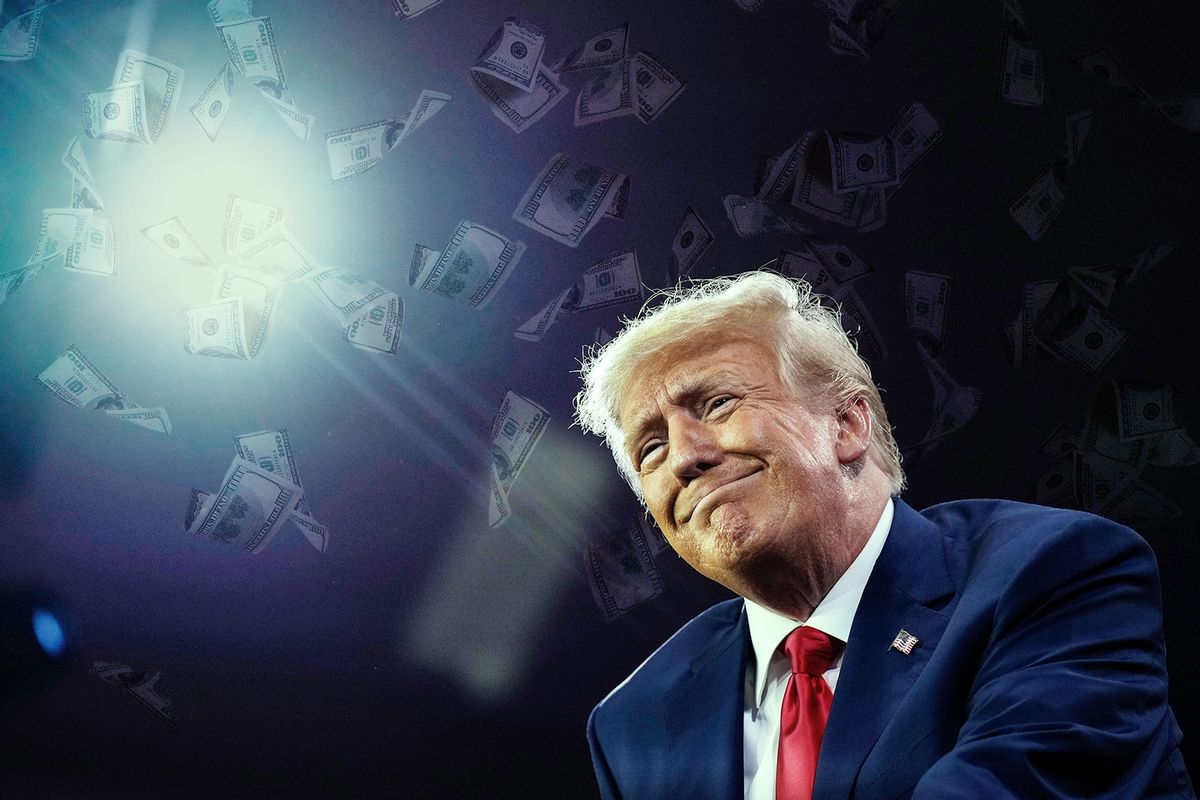Trump’s Jan. 6 indictment is his biggest grift yet

Donald Trump’s latest indictment for trying to obstruct the 2020 election will likely become his biggest grift to date. This week’s FEC filings revealed the extent to which Trump uses his donors’ money, rather than his own, to pay his lawyers.
Trump’s Save America PAC spent over $40 million of small donor money on Trump’s legal defense in the first half of 2023. The PAC has now spent $56 million on his legal fees since 2022, more than any other expense category.
Following the FBI’s search of Mar-a-Lago, Trump’s PAC raised as much as $1 million per day. An Open Secrets analysis shows Trump also collected hundreds of millions in donations to a non-existent “Official Trump Defense Fund” by continuing to claim the 2020 election was stolen, a claim he will now amplify as part of his Jan. 6 defense. Overall, supporters have donated over $500 million to date to return Trump to the same office he tried to subvert.
First the Big Lie, then the Big Rip-off
Long before Tuesday’s indictment, Trump’s 2024 re-election campaign presented a bombastic blend of ego, retribution, and misinformation that monetized his criminal exposure. Rather than undermining his candidacy, his assorted legal challenges have fattened his campaign war chest and elevated him to political martyrdom, as his mounting indictments invigorate a fact-challenged base cocooned by right-wing media.
Trump’s federal indictments in Washington and Florida, felony charges in New York, and looming criminal indictment in Georgia prompted GOP contender Will Hurd to observe that Trump is running for president to stay out of prison. Hurd was booed at the GOP’s Lincoln Dinner for stating the obvious.
Using a poor man’s dollar to pay a billionaire’s bill
Despite the staggering sums Trump’s PAC has spent on lawyers, no definitive answer as to the legality of using donations to pay legal fees has emerged from the FEC.
Whether litigation expenses can be paid from campaign funds at all turns on the FEC’s “irrespective test,” which asks whether the legal challenge would have arisen irrespective of holding or seeking office.
Bracketing the ethics of paying Trump’s witnesses’ legal fees and thus influencing their testimony, under the Federal Election Campaign Act, campaign funds may be used for “ordinary and necessary” expenses that arise under the duties of an individual holding or seeking Federal office. The law prohibits using donated funds for “personal use” to pay an expense that would exist irrespective of the candidate’s campaign or duties, like a mortgage or tuition, because those bills do not arise from holding or seeking office.
The FEC’s “irrespective test”
Using donations to pay legal fees falls into the ‘maybe’ category and will likely be determined on a case-by-case basis in an FEC advisory opinion.
Whether litigation expenses can be paid from campaign funds at all turns on the FEC’s “irrespective test,” which asks whether the legal challenge would have arisen irrespective of holding or seeking office. In several advisory opinions, the Commission has said that campaign funds may be used to pay for up to 100 percent of legal expenses related to campaign or officeholder activity, where such expenses would not have occurred had the individual not been a candidate or officeholder.
Although Trump was a president of many firsts, including the first to be found guilty of sexual assault, the FEC has approved using campaign donations for litigation expenses where the candidate/officeholder was the defendant and the litigation arose directly from campaign activity; and has approved using donated funds to defend against investigations into to the candidate/officeholder’s role as a candidate or officeholder.
Legal ambiguity gives Trump wiggle room
Applying the FEC’s irrespective test could deliver absurd results. In the E. Jean Carroll case, for example, the irrespective test could give Trump a semi-colorable argument that he would not have been the target of her successful sexual assault and defamation suit, had he not held the highly visible office of President. In the Mar-a-Lago documents case, Trump could argue that he wouldn’t have taken the beautiful papers if he hadn’t been provided access to them to begin with, the whole thing is a political witch hunt, pass the donation plate.
In Georgia, Trump’s request to the Secretary of State to “find” 11,000 votes needed to defeat Biden would not have occurred but for Trump’s campaign. On the latest indictment relating to the Jan. 6 coup attempt, Trump assembled the mob to stop a stolen election, which he would not have done had he not been the president from whom the election was stolen.
It will be interesting to follow the advisory ruling(s) to see if the FEC teases out a crime/fraud exception to the “irrespective test.” To protect the public, donated funds should never be used to defend a clear pattern of criminality. Otherwise, as Will Hurd observed, Trump’s campaign is another instrument of fraud designed to insulate him from culpability and make someone else pay for his crimes.
Read more
about this Trump’s Jan. 6 indictment

